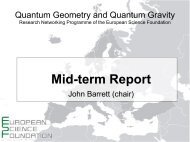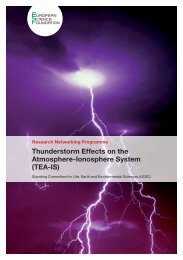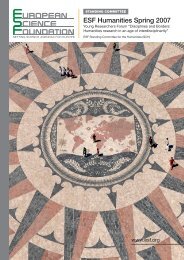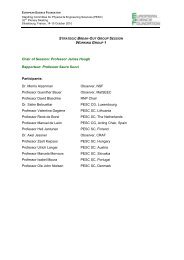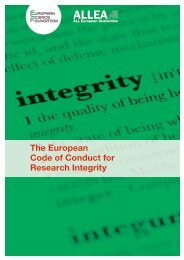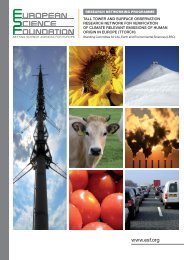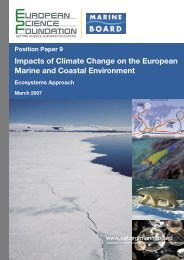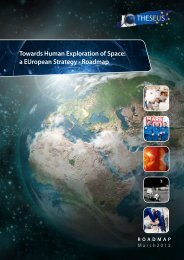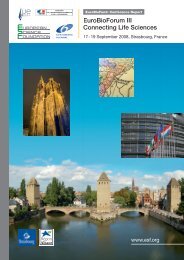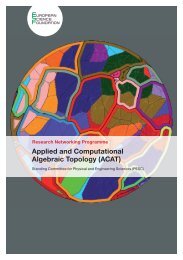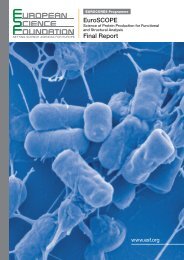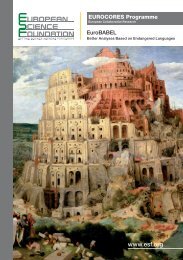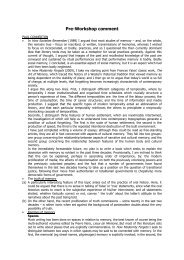Synthesis Report - European Science Foundation
Synthesis Report - European Science Foundation
Synthesis Report - European Science Foundation
Create successful ePaper yourself
Turn your PDF publications into a flip-book with our unique Google optimized e-Paper software.
USS FishyNO!NO!YES!HospitalGovernanceas a Crosscutting Theme inHuman Dimensions <strong>Science</strong>NO!YES! YES!10Responses to Environmental and Societal Challenges for our Unstable Earth (RESCUE)Figure 1.Two recent examples of current, partly integrated approaches toconsider some of the global change issues: IGBP “Climate-ChangeIndex” brings together key indicators of global change: atmosphericcarbon dioxide, temperature, sea level and sea ice (tinyurl.com/6n9f2e3), and IHDP “Earth System Governance” approach, whichemphasizes the role of institutions and governance in relation toglobal change issues (www.ihdp.unu.edu/article/update-3-2009).ing policy makers, to develop medium- to long-termstrategies for future research activities and applications.It is anticipated that RESCUE will have positiveimpacts on research to support transitions to sustainabledevelopment*, especially in Europe whereits efforts have primarily been focused, through itsemphasis on a common strategic understanding,improved coordination of scientific endeavours, newapproaches at the science-policy-society interfaceand capacity building.The RESCUE activities included a kick-off meetingin Rueil-Malmaison, France, in September 2009,followed by virtual and face-to-face meetings as wellas a few other dedicated activities of the workinggroups and task force. An alignment workshop washeld in Ispra, Italy, in June 2010 and an integrationworkshop took place in Antwerp, Belgium, inDecember 2010. Finally, there was a stakeholders’conference in Brussels, Belgium, in May 2011. TheRESCUE work has been coordinated by a ScientificSteering Group composed of the leaders of theWorking Groups and chaired by Professor LeenHordijk and Professor Gísli Pálsson (Annex 1), andmonitored by a Quality Reference Group (Annex 2).The coordination of this joint initiative has beenled by Dr Bernard Avril at the <strong>European</strong> <strong>Science</strong><strong>Foundation</strong>.It was recognised at the outset (RESCUE, 2009)that the challenges set out by RESCUE have also beentaken up by diverse actors and institutions*, includingan earlier ESF Forward Look on Global ChangeResearch conducted in 2002 (ESF, 2002). The 2002exercise addressed the themes of a) collaborationbetween the natural and social sciences; b) theinterface between the science and policy domain;c) the requirements for monitoring and data; andd) capacity building. Since the 2002 report, whichessentially set an agenda for Earth System sciencewith a focus on Europe, there have been substantialdevelopments in the ways that social sciences engagewith the issues of global environmental change,and in the interdisciplinary dialogues between thenatural and social sciences. RESCUE was thereforedevised with much deeper engagement by researchersactive in the domain of the human drivers ofand consequences of global change. The RESCUEinitiative also focuses much more on what needs tochange in the way that research and education arefunded and organised, so that the challenges of anunstable Earth can be addressed.The RESCUE foresight initiative is a further contributionto international debate about research5for global sustainability* such as the ‘FutureEarth – research for global sustainability’ initiative6derived from the ‘Earth System <strong>Science</strong> forGlobal Sustainability’ visioning process, led bythe International Council of <strong>Science</strong> (ICSU), withinvolvement of the International Social <strong>Science</strong>Council (ISSC)7, and the Belmont Challenge (ICSU,2010b; IGFA, 2011)8. At the same time that RESCUEwas carrying out its work, ICSU and ISSC engaged5. For more information about research on sustainability see,for example, Jäger (2009), www.essg.eu, www.visionrd4sd.eu,or sustainabilityscience.org. Recent overviews of sustainabilityassessment purpose, methodologies and practices are provided byFrame and O’Connor (2011) and Singh et al. (2009).6. www.icsu.org/earth-system-sustainability-initiative7. See www.icsu.org and www.issc.org8. Developed by the Belmont Forum/IGFA Council of Principals,www.igfagcr.org/index.php/challenge



